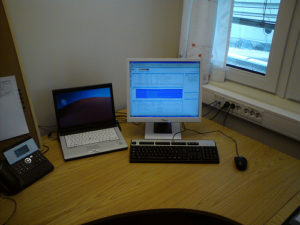– By Sam Moolman
Admin… The horror!
Journalists generally tend to shy away from planning and order – not knowing where we’ll be or who we’re going to interview on any given day is often seen as a bonus. For most of us, “routine” simply means getting the info you need and filing a story no matter what, before jumping into the next assignment almost immediately. I’ll admit, dealing with the unexpected is unavoidable, but when it comes to things that we can foresee, why aren’t we more organised?
Planning ahead of time could mean that you’ll be able to file all your stories before deadline and still have time to eat and do your laundry. If you don’t have a daily planner, get one, and make it a habit to jot down what needs to be done in your life. Here are some tips that will help you to use your planner more effectively:
Tip #1: Create a master task/project list at the beginning of every month.
Jot down scheduled appointments, interviews and deadlines, as well as your own personal goals to give yourself a broad outline of what the month ahead is going to look like. But remember, it can be overwhelming if your list is extensive. Be reasonable about the time you allocate to each project, and only refer to your master list every once in a while. Focus more on a daily “to-do” list.
Tip #2: Compile a daily “to-do” list to help keep things in perspective.
Focusing on the smaller things you need to do each day is like taking small bites out of something bigger. By the end of the month you’ll probably find that you’ve tackled the whole project bit by bit, and you’ll have avoided the pressure of the project as a whole looming over you just before your deadline.
Tip #3: Plan your day the night before
Once you get cracking in the morning there’s barely any time to think about how your day should be structured. In the same way, plan the week ahead before it starts.
Reflecting on what needs to be done at the beginning of each day, week and month will help you touch base with your life. You’ll think clearly and feel more relaxed, prepared for what lies ahead.
Everyday Basics
Besides planning ahead as much as you can, you also need to lay some ground rules for yourself, especially if you’re freelancing:
- Get to work early if you can. The office will be calmer and quieter, and you’ll be able to regroup from the day before and get your mind focused. As a freelancer, I “get to work” in the wee hours of the morning before everyone around me wakes up. In this time I try to catch up on the news and any other work-related reading that I set aside for myself the day before.
- Schedule some time once a month to organise your desk and file or throw away errant papers that create clutter.
- Remember to set aside time for things like dentist appointments and the monthly grocery run. It’s no use planning your work life if your personal life is still going to fall to pieces.
- Schedule time in your day for interruptions. Life, in the end, is unexpected and we all need to acknowledge that sometimes an agenda needs to be planned in pencil instead of ink.
Routine is important, even for right-brainers, so try allocating certain time slots for certain actions every day. These actions will eventually become positive habits that make you more efficient. The creative “mess” in your head doesn’t need to be reflected in your surroundings. You’ll find that the disorder around you may in fact be clouding your artistic vision; and establishing order in the other facets of your life will help you focus on that vision.
It also helps to treat each individual story you’re working on like a project. Make lists of things you need to remember like priorities, goals, and contact numbers. Make detailed notes of what you’ve already done and what needs to be done. This may seem redundant, and you might feel you can remember these things on your own, but as a journalist you can sometimes juggle an infinite amount of information on just one story. I know that I need to write down the details of every contact I speak to and what our conversation entails. There have been times where I’ve lost track of these things and called the same person twice, forgetting that I already spoke to him!
About the Author

Samantha also works as an assistant lecturer for the University of Pretoria’s Department of Journalism.














